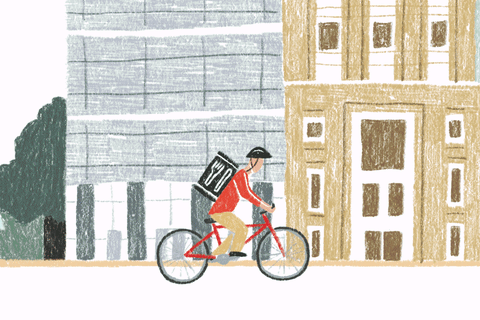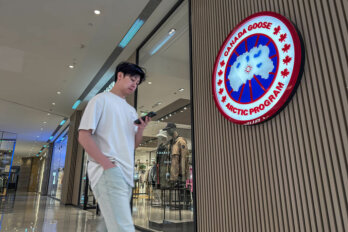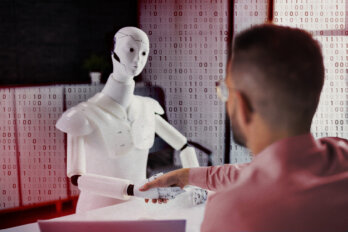I take my first order on a Sunday morning in April 2016 at a small breakfast café. I wait at the bar, balancing the delivery bag on my lap. The restaurant, in Toronto’s leafy west end, isn’t yet busy, but the atmosphere is building. Dishes clang. Servers shout over one another. Tables are being wiped down. When my food slides down the white counter in a brown paper bag, I grab the order and head out.
I’m a full-time freelancer. I write and tutor. I also do editing, research, photography, and transcription. It’s all bits and pieces. Chunks of time. Allotments of labour. This morning, however, I’ve started as a bike courier paid to deliver food. I zip down a quiet street, then progressively louder ones. I get down to the highway, near the lake. The sun is out now and already merciless. I fight traffic. I swear. I sweat. I almost get clipped by a taxi. I swear more.
When I reach the destination, I forget the name of the person who ordered the food. I talk to the concierge in the building’s lobby. He’s a large, jolly, and bespectacled man who doesn’t look like he’s moved from his chair for some time. He calls the restaurant and asks for the order number. He has a soft voice. I can hear the waitress shouting through the phone. “He should know!” She’s right, but this is my first day.
We’re interrupted by the ding of an elevator. A hungover teen emerges. His hair is a wave of blond, a white T-shirt clings to his chest, and green plaid pajama pants drag at his heels. “Do you have my eggs Benny in there?” he says huffily. I say I do. He grabs the bag and stomps back to the elevator. I exchange a knowing nod with the concierge, our eyes rolling in unison, and I head back into the world.
I wonder what happens when someone orders a pizza. A pizza won’t fit in the delivery bag. I figure there has to be something in the algorithm, something built into the app, that funnels pizza orders to those with vehicles. Then I get a call. It’s a pizza delivery. At the restaurant, a server hands me two bags of food and a cartoonishly large pizza box. “I’ll let you figure that out,” he says.
I push my bike along the busy sidewalk, trying to get back onto the road. I keep the pizza balanced across my handlebars. An older woman glares at me and shakes her head and clicks her tongue, tsk-tsking. I’m trying. I want to tell her, I’m trying.
I grew up in a rural farming village in southern Ontario. A blue-collar town. As a kid, I hammered fence posts, baled hay, painted barns, wrapped pallets, shingled roofs. I had dozens of summer jobs where I dipped in and out of work. As I got older, I worked as a landscaper, a tree planter, a mailman. Still, even in the working-class milieu, the indoctrination against blue-collar work began early. “Go to university or you’ll never be successful,” they told us at school. But they didn’t say why.
I went to university. Twice. Graduated with two degrees and enough debt to fill a lifetime. Others stayed on the farm, or settled into the assembly line, or inherited family businesses. They are doing fine and finding their own way. Everyone has their own obstacles. We graduated, academically and generationally, into a growing storm. We finished our workbooks, and cleaned out our lockers, and walked across the stage to shake hands with the principal, then we stepped outside into the rain. The jobs have become gigs, and the gigs are unsteady.
In the summer of 2016, Foodora employed more than 500 delivery drivers. That’s just one company of many. Bike couriers continue to fill the downtown core. There are perks: making your own schedule, signing on and off at your leisure, weekly payouts, exercise. If you learn the popular hours, neighbourhoods, and routes, you can earn more than minimum wage. You can get by, but it’s a slog. This job has all the symptoms of the gig economy. Part-time. No health benefits. No pension. No stability. No other options.
My second day brings an order for eight litres of organic, cold-pressed juice. I am to deliver this to a boardroom on Bay Street. I ride past the suits, the towering buildings, the men shouting into Bluetooths, the cabbies that sit idling. I reach the lobby, and the receptionist greets me with an inquisitive head tilt. Does she recognize me? Do I recognize her? I don’t. I’d rather not be recognized. She leads me into a conference room, and I set the bottles on the table and try not to let my sweat hit the wood grain. I leave as quickly as I can.
Outside, I bump into another rider, delivery bag strapped to his back.
“You making anything?” I ask him.
“Still waiting for the first call,” he says.
He tells me he’s a recent engineering grad. He had a six-month contract after school but hasn’t been able to find anything since. “For now, this will have to do,” he says.
I tell him it’s my second day.
“Good luck,” he says. “It’s a lot of waiting around.”
This soon proves to be one of the worst things about this job. You spend time waiting in restaurants, waiting in lobbies, waiting in traffic. There’s a lot of time to think, a lot of time to grow frustrated. Eventually, I stop waiting. I stop wishing. I start riding to somewhere else, hoping each new location will prove more bountiful than the last.
I don’t know if this strategy is effective. I still think about the things I should be doing instead, but moving feels better than staying still, so I keep riding. When you’re broke, your body becomes your last resort, a mostly reliable means to make money that also comes with great precarity. If you get injured in a low-wage job with no employment insurance, there’s nothing to fall back on. You pay with your health.
I feel this job in my body. My neck cracks, my shoulders pop, my ankles creak. Some nights, I ride until my legs turn numb and the wind whips tears in my eyes and the world becomes fuzzy at the edges. Then I have a choice. I can keep riding or I can stop and wait until my path becomes clear again.
Each morning, I take my first order of the day in the same park. My office is a bench covered in pigeon shit. I am surrounded by concrete and honking cars and fluttering pigeons with their low hoots, and rustling overgrown grass spilling from the flower beds. Other people come and sit to take their lunch or argue into their phones or shout about Jesus.
My delivery bag sits next to me, gives me away. I can’t hide it, I already tried. The bag costs $25, so after the first day, which included three hours to sign up—time that’s spent mostly waiting to fill in paperwork—and five hours of riding, I owed the company eighty-nine cents. There are small acts of dissent. That first night, on the ride home, I stopped at a dollar store. I paid $3 for a black bandana and a box of safety pins, then I folded the bandana in half and pinned it over the company’s logo. I tell my friends that I’m going to rebrand to 2 Degrees Delivery, in honour of that loan-funded education. Worth every penny, I think, waiting for my phone to buzz.
At one restaurant, I meet another cyclist who has also covered up his company’s logo. I ask him why. “Because I’m working for three companies right now,” he says. “It’s the only way to make any money.” He’s wearing one of those tiny cycling caps with brim flipped up and he has a tattoo of a bike chain on his calf. His phone is plugged in to an external battery. He looks tired and worn down.
The afternoon of my second day, I get an order for crepes. It’s surprising how many people order crepes. Half of the orders I get are for crepes. The address is somewhere I haven’t delivered to yet. Forest Hill. The rich neighbourhood. I bike uphill, the homes growing larger and progressively gaudier as the elevation climbs. I circle the streets, looking at the mansions that fill city blocks, then I find the address. A lady cradling a tiny dog, her face covered in ointment, a bathrobe on, opens the door just enough to stick her arm through. She snatches her crepe and bangs the door shut. I hear the lock click. “You’re welcome,” I say to the door.
On my way back to the park, I pass two women who are selling clothes and shoes and a few books. The items are laid out neatly, atop folded blankets. They sit under an oak tree. I stop to take a look at the books. One of the women says she works in retail and the other is a server. “I do that too,” says the server, pointing to the bag strapped to my shoulders.
“Do you like it?”
She shrugs. “It’s okay, I guess. I don’t like the traffic. It feels kind of dangerous.”
It is kind of dangerous. There are many bad cyclists, but there are also many bad drivers and many bad pedestrians. It’s a sometimes fatal mix of aggression and inattention, and from the bike lane, you get a view of how people handle the pressure. Some better than others. Toronto is particularly perilous. In the summer of 2016, more than a 1,000 cyclists and pedestrians were hit by cars in less than four months.
Of particular note are the old guys, invariably in BMWs, who force their way into traffic, hyperventilating when their intrusions are not met with the degree of servitude they believe they deserve. They scream inside their small, sealed chambers. When car traffic is backed up and the bike lane is clear, it feels good to pass those guys.
You learn about human nature when you ride a bike through the arteries of the city. You see couples arguing in parked cars. Elderly ladies collecting beer bottles. Street performers whose routines become familiar. Guys on dates trying too hard. Guys on dates not trying hard enough. Old men falling over drunk. Good dogs. There are so many good dogs.
People are mostly good. That’s another thing you learn on this job. I deliver to downtown offices and suburban schools, to addiction-withdrawal centres and auditoriums, to pregnant mothers and hungover teens and elderly folks who are genuinely amazed they are able to summon bread pudding to their door.
Six months of delivering go by before other work comes through and I can afford to stop riding. I remember my last order. Chicken dumplings. The concierge accompanied me in the elevator up to the room. He was an extremely tiny man with a pencil-thin moustache and a red coat with gold buttons. He twirled his keys on a brass ring, which spun in his small hand like a hula hoop. On our way back down, he sighed. “I see more of you guys now than the pizza guys or anything else,” he said. There was sadness in his voice. Maybe he misses the familiarity that came with the seeing the same faces. Maybe some of them became his friends.
“But I guess this is the future,” he said.
I wanted to tell him that it’s a grim future, that the gig economy strips away the rights of workers, that it exploits the poor and the underemployed and those who do not have the capital to participate. That it operates on inequality. That the anxiety that accompanies the precarity can be suffocating and that the only time the money is even close to good is when the weather is so bad that going outside is akin to human sacrifice. But I didn’t.
“Let’s hope not,” I said instead.
When I got outside, I turned my phone off. I thought about being back home and those summer jobs—where I’d step into a world where others spent their lives, then leave again on the premise that I was off to something more, something greater than whatever that had been. Back then, my bosses didn’t say much. They didn’t have to. But co-workers were more jovial, more likely to launch into soliloquies from the pulpit of their pallet jack. “Find one thing and do it well.” “A job and a life are two different things.” “Spend it when ya got it.” It wasn’t always the best advice. It didn’t need to be. There was lived experience worn into those calloused hands, and sometimes that is enough. There was pride in a day’s work done well.
I’m grateful that I had the opportunity to stop, but I won’t miss the job. I feel guilty for the embarrassment I felt that day in the downtown office. That was pride and not reason. The gig got me through a creatively ruinous stretch, when my body proved more reliable than my mind.
I don’t take any more orders. Instead, I ride through downtown to the lake. I sit at the edge of the boardwalk with my feet dangling above the water. The moon is full and the lake is calm and, for a few minutes, so am I.





